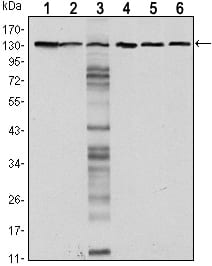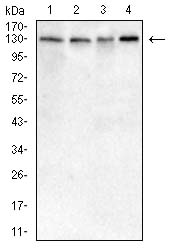

| WB | 1/500 - 1/2000 | Human,Mouse,Rat,Rabbit |
| IF | 咨询技术 | Human,Mouse,Rat,Rabbit |
| IHC | 咨询技术 | Human,Mouse,Rat,Rabbit |
| ICC | 技术咨询 | Human,Mouse,Rat,Rabbit |
| FCM | 咨询技术 | Human,Mouse,Rat,Rabbit |
| Elisa | 1/10000 | Human,Mouse,Rat,Rabbit |
| Aliases | UVO; CDHE; ECAD; LCAM; Arc-1; CD324; CDH1;E-cadherin;E cadherin |
| Entrez GeneID | 999 |
| clone | 7A2 |
| WB Predicted band size | 135kDa |
| Host/Isotype | Mouse IgG1 |
| Antibody Type | Primary antibody |
| Storage | Store at 4°C short term. Aliquot and store at -20°C long term. Avoid freeze/thaw cycles. |
| Species Reactivity | Human,Mouse,Rat,Rabbit |
| Immunogen | Purified recombinant fragment of human CDH1 expressed in E. Coli. |
| Formulation | Purified antibody in PBS with 0.05% sodium azide. |
+ +
以下是关于CDH1(E-cadherin)抗体的3篇代表性文献示例,包含文献名称、作者及摘要概括:
---
1. **文献名称**:*E-cadherin inactivation in hereditary diffuse gastric cancer*
**作者**:Guilford, P. et al.
**摘要**:本文研究了CDH1基因突变在遗传性弥漫性胃癌(HDGC)中的作用,通过免疫组化(使用CDH1抗体)发现患者组织中E-cadherin蛋白表达缺失,揭示了CDH1突变与肿瘤发生的直接关联。
---
2. **文献名称**:*Loss of E-cadherin promotes metastasis via multiple downstream transcriptional pathways*
**作者**:Padmanaban, V. et al.
**摘要**:研究利用CDH1抗体通过Western blot和免疫荧光分析,证实E-cadherin缺失通过调控上皮-间质转化(EMT)相关基因促进癌症转移,为靶向治疗提供依据。
---
3. **文献名称**:*Comparative validation of anti-E-cadherin antibodies for immunohistochemistry in diagnostic pathology*
**作者**:Duraes, C. et al.
**摘要**:评估了多种商用CDH1抗体的特异性和敏感性,发现克隆36和NCH-38在福尔马林固定组织中的染色一致性最佳,为临床诊断中抗体选择提供了指导。
---
这些文献涵盖了CDH1抗体在基础研究、临床诊断及癌症机制中的关键应用,可作为相关领域的参考。如需具体文献来源,建议通过PubMed或Google Scholar检索标题获取全文。
The CDH1 antibody targets the protein product of the *CDH1* gene, which encodes E-cadherin, a classical member of the cadherin transmembrane glycoprotein family. E-cadherin plays a critical role in mediating calcium-dependent cell-cell adhesion in epithelial tissues, maintaining tissue architecture, and regulating cellular polarity, differentiation, and signaling. It is widely expressed in epithelial cells and interacts with intracellular catenins to link the actin cytoskeleton, facilitating junctional stability and tissue integrity.
Dysregulation of E-cadherin is strongly associated with cancer progression, particularly in epithelial-derived malignancies such as gastric, breast, and lobular carcinomas. Loss of E-cadherin expression or function disrupts cell adhesion, promoting epithelial-mesenchymal transition (EMT), tumor invasiveness, and metastasis. Germline mutations in *CDH1* are linked to hereditary diffuse gastric cancer (HDGC) syndrome, underscoring its role as a tumor suppressor.
CDH1 antibodies are essential tools in research and diagnostics. They are used in immunohistochemistry (IHC), Western blot (WB), and immunofluorescence (IF) to assess E-cadherin expression levels in tissues or cell lines, aiding in cancer subtyping, prognosis evaluation, and EMT studies. Reduced E-cadherin detection often correlates with poor differentiation, advanced disease stages, and metastatic potential. Additionally, CDH1 antibodies contribute to understanding developmental biology, wound healing, and tissue remodeling processes. Their specificity and validation are crucial for accurate interpretation in both experimental and clinical contexts.
×